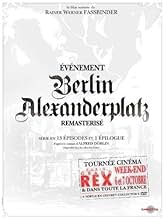IMDb-BEWERTUNG
8,4/10
5048
IHRE BEWERTUNG
Franz Biberkopf wird aus der Strafanstalt entlassen. Er hat seine Freundin Ida erschlagen. Jetzt hat er Schwierigkeiten sich wieder im Leben zurechtzufinden.Franz Biberkopf wird aus der Strafanstalt entlassen. Er hat seine Freundin Ida erschlagen. Jetzt hat er Schwierigkeiten sich wieder im Leben zurechtzufinden.Franz Biberkopf wird aus der Strafanstalt entlassen. Er hat seine Freundin Ida erschlagen. Jetzt hat er Schwierigkeiten sich wieder im Leben zurechtzufinden.
- Auszeichnungen
- 2 Gewinne & 4 Nominierungen insgesamt
Folgen durchsuchen
Ausgewählte Rezension
Alfred Doeblin's poignant novel must have impressed Fassbinder deeply. In an interview talking about his episodic masterpiece, Fassbinder announces, in a matter-of-fact manner, that writing the script was not difficult because he pretty much knew the book "by heart". And, indeed, we should take his words literally, considering the extent of the work and the cinematic achievement it represents. Berlin Alexanderplatz is not an easy film to watch; not because of some artistic imperfection. On the contrary, because it is a dense and tortuous, but honest, observation of the human condition, its contradictions and dark nature. Fassbinder approached this project with an open heart and a razor-sharp discipline. He knew what he wanted to recreate, and the world he conjured up captures our attention by tearing away any romanticized notion of reality. The story takes place in Berlin around the years of 1926 and 1928: Germany, at the brink of one of the darkest periods of human existence. A universe breathing betrayal at a cellular level. Murder, jealousy, perversity, hatred, maliciousness, innocence, fragility, fear, longing, guilt, embarrassment, lack of hope, evil, passion, lust, doubt, indecision, suffering, pain, sex, death, blood, insecurity, poverty, uncertainty, madness, hell, despair, surrender, shock, chaos, dirt, soul, faith, and a constant flow in a spectacle of the Shadow of the human Psyche and their intrinsic Divinity. The story is told in thirteen parts and an epilogue. It is a long cinematic experience. Mr. Fassbinder acts as a sort of Brechtian observer with a soft spot on his heart. The first part runs around 82 minutes. The next twelve which follow are about an hour-long each. The last is the epilogue that is 112 minutes of an odyssey into madness and surreal visions of the Unconscious. This last part plays like a roller-coaster ride through the past, the present and the future as we exchange empiric data in order to survive. It's a spiral descent into hell. Dante's inferno is revealed in every corner. The main character in this story is Franz Bieberkopf. He re-enters the world after a four-year sentence in the Prison of Tegel. His crime: killing his girlfriend in a fit of anger and despair. He is the anti-hero we make acquaintance with, Nietzsche's Superman in anguish. Our limitations and awe. In times of terror the arrows flow amply. Doeblin's complex narrative and Rainer's impeccable rendition outlive their creative minds. The parallels can be tracked into our times. We can only hope we have learned some lessons. The Weimar Republic was created after WWI in an attempt to establish Germany as a liberal democracy. It failed with the ascent of Adolf Hitler to power, and with the formation of the Nazi party. In 1933, the Third Reich takes over. Doeblin's narrative takes place in the last years of the Weimar Republic. Berlin Alexanderplatz is a phenomenal work of art that needs to be absorbed slowly. Fassbinder's work offers the viewer a similar involvement to reading the book. We get to spend more time with the characters and their settings. I watched one episode per day on average, but there were times I watched two on the same day. I also took breaks over the weekends, accommodating my schedule and my mood. This is undoubtedly a remarkable cinematic experience!
- ribeirovaldeck
- 27. Okt. 2008
- Permalink
Handlung
WUSSTEST DU SCHON:
- WissenswertesThis was screened at the Vista cinema in Hollywood in August 1983, in its entirety (with a 2 hour break for dinner), making it the longest film ever to be commercially screened (15 hours, 21 minutes). Heimat - Eine Chronik in elf Teilen (1984), which is only a little longer at 15 hours and 40 minutes was shown in German cinemas and at the London Film Festival, but not in a single screening, instead being split across a weekend with a night in between the first and second parts.
- VerbindungenEdited into 365 days, also known as a Year (2019)
Top-Auswahl
Melde dich zum Bewerten an und greife auf die Watchlist für personalisierte Empfehlungen zu.
Details
- Erscheinungsdatum
- Herkunftsländer
- Sprache
- Auch bekannt als
- Berlin Alexanderplatz: Remastered
- Drehorte
- Produktionsfirmen
- Weitere beteiligte Unternehmen bei IMDbPro anzeigen
Zu dieser Seite beitragen
Bearbeitung vorschlagen oder fehlenden Inhalt hinzufügen






















